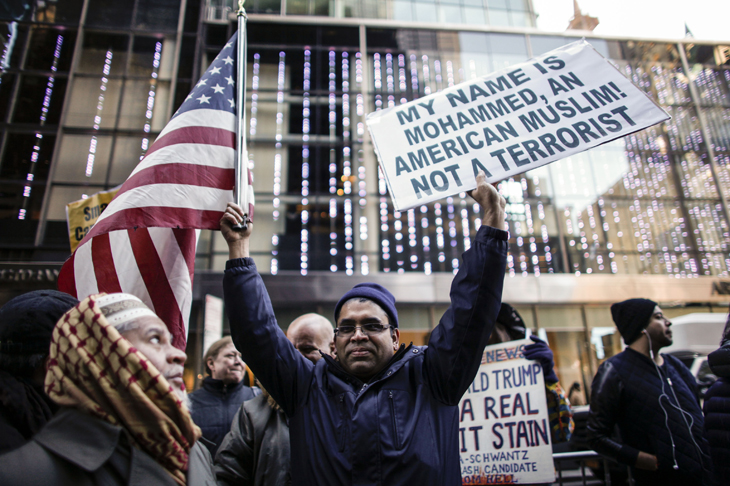Throughout John Bercow’s political career he has felt the need to atone for his student days when he was a member of the Monday Club. The Monday Club’s policy called for an end to Pakistani immigration, voluntary repatriation, and other ideas that would make Donald Trump blanch. Bercow now parades himself as a champion of liberal values and this week declared that he would not invite Trump to address Parliament on account of his ‘racism’ and ‘sexism’. He had welcomed China’s Xi Jinping and Indonesia’s President Yudhoyono, but decided he must draw the line at the President of the United States.
In so doing, Bercow has helped demonstrate why Trump won the American presidential election. Through his bombastic language and taunting 3 a.m. tweets, the US President has perfected the art of winding up his critics to the point that they begin to sound even less reasonable than him. Thus he ensures that, while he will never convince many Democrats that he is their president, support among his own supporters remains solid, and independent voters grow wary of his opponents. Trump built his candidacy around the conceit that a war needs fighting against the liberal elite that has lost bearing on reality, and that elite seems only too keen to prove him right.
The many marches and protests against Trump’s travel ban on citizens of seven countries has served only to stir up feelings among those who already opposed him. A CNN poll this week suggests that 47 per cent of Americans agree with the measure — almost exactly the same percentage of voters who backed Trump in November’s election. Support has remained strong in spite of obvious evidence of the cack-handed way in which the ban was implemented. An Iraqi interpreter who had already passed vetting to work for US forces found himself banned from America, along with many others who already had green cards and visas. Yet citizens of Saudi Arabia, which produced most of the 9/11 attackers, are not affected.
Trump’s opponents, however, do themselves no favours by trying to liken the travel ban to something out of the Third Reich. It is easy to see why his critics refer to a ‘Muslim ban’, given that Trump himself used this term on the stump. But his executive order manifestly isn’t a Muslim ban given that there are 45 predominantly Muslim countries to which it does not apply. It does, however, apply to all citizens — Christians included — of seven Muslim countries many of which have part or all of their territories are under rebel control. The Obama administration had already identified the problem of vetting travellers from these states.
Donald Trump is a narcissist. His insistence that he had a bigger crowd at his inauguration than did Obama in 2009 — in spite of clear evidence to the contrary — was bizarre. So, too, are his continued accusations of malpractice in the presidential election. It is absurd to watch the winner of the election continue to make these accusations when the loser — Hillary Clinton — has accepted the result with grace.
It’s also possible that Donald Trump will prove to be a spectacularly incompetent commander-in-chief. At the end of last month, he gave the order for an anti-terror raid in Yemen, which resulted in a firefight, civilian casualties and an American soldier being killed. The details of the operation are still unclear and hotly disputed — the White House insists it was a success — but so far they do not suggest that American interventions in the Middle East are going to be any more effective under Trump than Obama or Bush.
Trump’s opponents will go wrong if they overlook his real failings in order to keep insisting he is a fascist. It would be an unusual fascist who wanted smaller government and less military intervention abroad. As for Islamophobia, it is odd to see Europe’s leaders lined up against Trump when it is France which has banned Islamic headscarves in public and when Angela Merkel has proposed doing the same for the veil. If you want to witness hatred of Muslims, then the place to go is not Trump’s America, but Hungary, where a mayor this week declared that Muslims and gay people are not welcome in his town.
Charges of sexism are easier to sustain against Trump, given his past remarks and behaviour, but the attempt to present him as anti-women on account of his views on abortion are doomed to failure. On this issue, he is in the American mainstream, whereas the organisers of women’s marches against him are in the minority —polls suggest that a majority of US women favour tighter restrictions on abortion.
There is plenty for Trump’s critics to get their teeth into in the form of the executive orders he has already signed. His loosening of banking regulations ought to concern many who thought that bankers were part of the corrupt elite he wanted to dispossess. His withdrawal from the Trans-Pacific Partnership without any agreements yet to replace it brings into question his commitment on trade. But so long as the anti-Trump bandwagon sticks to poorly directed insults, the new President will be able to get away with what he wants. His critics should stop trying to make him out to be the personification of all evil and get down to the detail, in order to provide him with the opposition he deserves.
Got something to add? Join the discussion and comment below.
Get 10 issues for just $10
Subscribe to The Spectator Australia today for the next 10 magazine issues, plus full online access, for just $10.














Comments
Don't miss out
Join the conversation with other Spectator Australia readers. Subscribe to leave a comment.
SUBSCRIBEAlready a subscriber? Log in